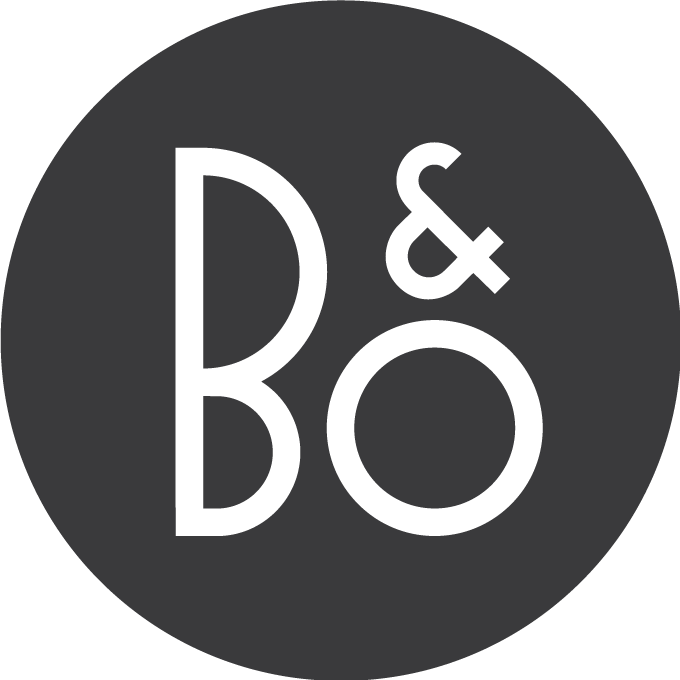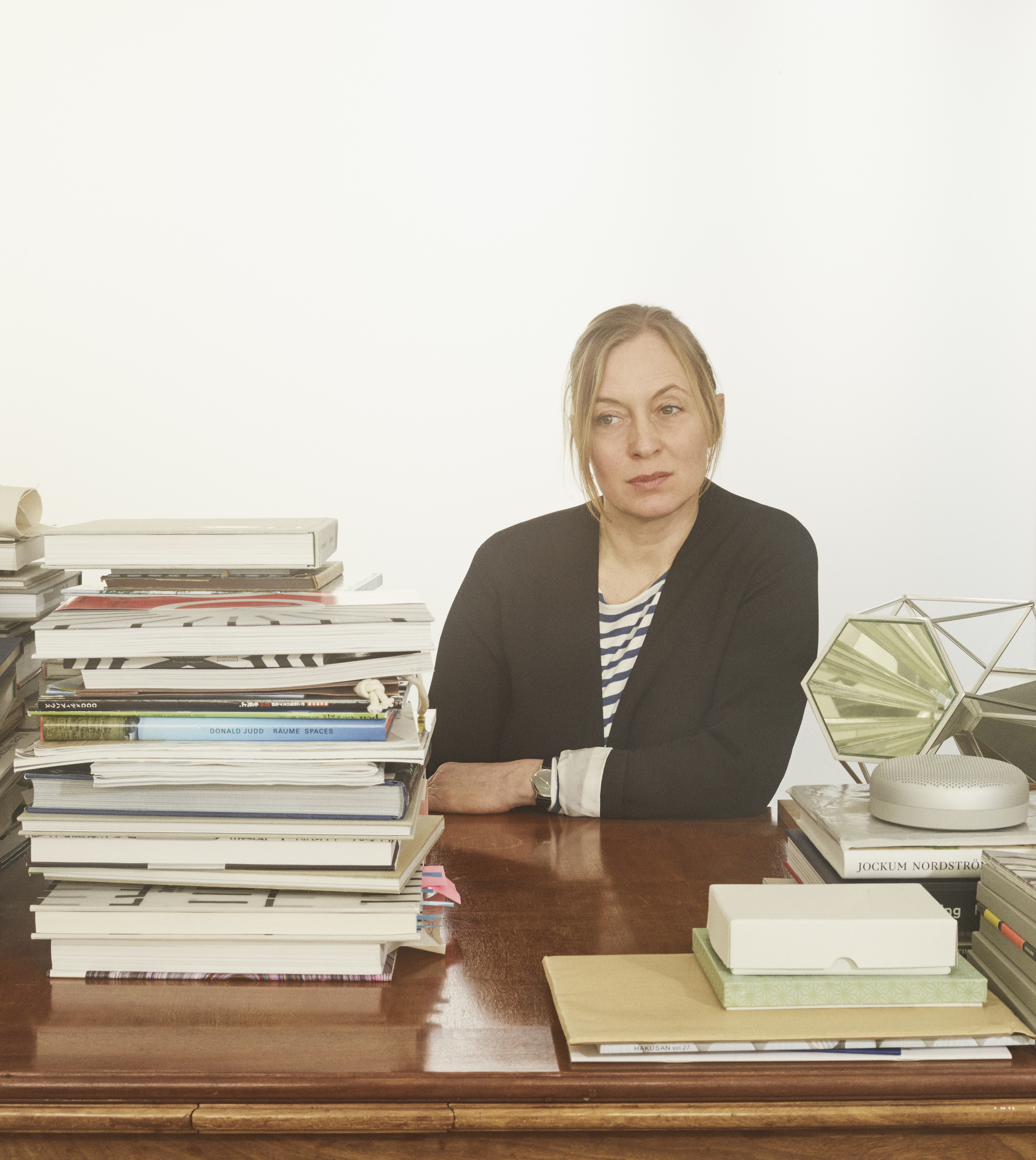Meet Cecilie Manz, designer of our newest, ultra-portable and beautiful sounding A1 speaker.
Spot the A1: Cecilie Manz in her Copenhagen studio, April 2016. Photographed by Casper Sejersen
Meet
Cecilie Manz
The award winning Danish designer tells us about her role in the making of B&O PLAY's A1 portable Bluetooth speaker, boiling ideas down to their essence and making good objects in our age of ever handier proportions.
| CONTRIBUTORS |
| PHOTOS: CASPER SEJERSEN |
Before and after: Beoplay A1 in situ with Manz's preparatory sketches
The objects that surround us are ever-smaller, especially technology like phones and portable speakers like our A1. How do you see the role of the designer changing within these increasingly constrictive parameters?
I think designers always need to be able to adjust and react to the different situations we find around us. We’re quite used to it, it’s part of our job! But at the same time we also need to be calm and reflective – so much changes so fast in this field and it’s not all good. Sometimes it’s progressive to stand still and observe rather than react wrongly.
I’m very dedicated to minimalism and love small objects. It pushes both me and the developers to perform twice as good. We just need to be aware of the limit where an object becomes absurd or non-functional: where buttons are uselessly pin-sized, and umbrellas are so collapsible they fit snugly in your front pocket but don’t help at all when it rains. That’s just stupid.
I guess it's just about using your senses: when and what to work on, what to make and what to put out into this world that’s filled with so many different objects and choices.
Beoplay A1 at home among all the other beautiful objects in Manz's studio.
Could you tell us a bit about how B&O PLAY commissioned you for this new speaker and what you're especially proud about it for?
You could say the path towards ‘smaller' already started with the Beolit12 speaker. While working with that I had the idea of a smaller version – the Beoplay A2 – and B&O PLAY luckily had the same thought. The A1 was a natural step following the A2: even smaller and better sound in a more compressed space.
The shape itself, the flat cylinder, was quickly decided on from very early on in the process. We wanted it to feel smooth and soft in the hands since you handle it a lot. In and out of your bag, hanging loose and getting a characterful patina from being used in everyday life.
I’m very happy about the A1’s smooth appearance. It’s almost like a sanded stone with no sharp edges, even though it’s made of two joint materials: aluminium and polymer. And of course the great job done by the acoustic technicians. They managed to develop a new speaker component inside that creates an incredibly rich sound with a very even volume.
““Being able to sense that something is just right is very important””
““My most important job is to keep my eyes on the character of the object””
How does your creative process work? Many of the pieces you make look as if the materials have almost come together themselves naturally – how do you know when a piece is finished?
I start all projects in the same way. When I get a brief I read it carefully and boil it down to the essentials: okay, you need a long wooden table, or a cup, or a portable Bluetooth speaker, then work outwards from there. This is not to cut away the important details but to find the essential ones, to find out the functionality I should start to sketch in reaction to. Then comes model work – seeing everything 1:1 plays a very important part in my practice. Maybe the model is made out of cheap cardboard in the beginning, looking horrible, but it brings you further in the process and the next sketch is more detailed, so is the next model. Through the process I have meetings with the client, share computer drawings and so on. But everything revolves around my work table, with the models, the material references, colour samples and other components.
At a certain point in the process you have the feeling something is right, a character has been made. And this is the first step in the long process of finalising a design. Being able to sense that something is just right is important. Then comes all the unavoidable adjustments and corrections in the manufacturing stage with a lot of ping-ponging back and forth. My most important job is to keep my eyes on the character of the object through all the stages, to preserve its spirit in the sometimes muddy final sprint towards the deadline.
Many designers use music at different points in their creative process: specific tunes to help more preparatory sketching, other tracks that help with crafting prototypes and producing objects. Tell us a bit about your relationship with sound and music?
Music is very important to me, though it’s by choice very quiet at the studio.
Sharing music is a very intimate thing. Perhaps because it’s so much about emotions and atmospheres I actually prefer to listen to music alone. Except of course if that’s the whole point, to gather around the same atmosphere and feeling through music.
When I'm sketching while starting up a project I’m very fond of Charles Mingus, Nina Simone, Keith Jarret, Eric Satie. Biking home (uphill) I really need The Black Keys…
Calm in the studio: Cecilie Manz, April 2016.
I’m sure you're asked this a lot, but how did you realise that you wanted to be a designer? And how do you keep developing creatively like you do?
Very early on I knew I wanted to work with my hands. I have always been fascinated by objects, materials, surfaces. But furniture and product design came in the loop by chance or mistake, I really didn’t have any ambitions in this direction until I started studying and became completely hooked. Now I can’t think of what else could make me this happy working with, I really love my job!
I sometimes take on projects or even invent tasks for myself that don’t look very promising in any rational or economical way. But it’s very important to maintain the joy and playful approach towards my work. It could be a one-off piece for an exhibition or an experiment that’s doomed to fail – it doesn’t matter, these breaks are crucial to keep me in motion and challenge myself differently.









